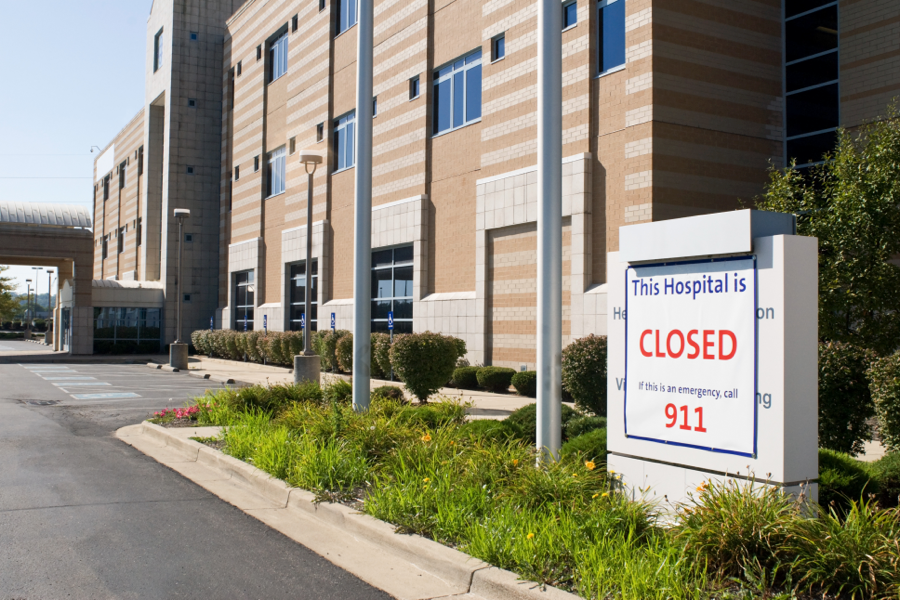
NEWS & RESEARCH
Disappearing Act: The Disappearing of America’s Rural Hospitals
-
 EveryNurse Staff
EveryNurse Staff
- Last Updated: 06/29/2019

Somewhere in America, someone is going to wake up at 2 am with excruciating chest pains. They will experience a full-scale cardiac event and will need immediate medical attention to spare their life. For many Americans, if they were to find themselves in this situation, their fates have been sealed. Their fates are not decided by the doctors or the nurses who come to work every day dedicated to the purpose of improving and saving as many lives as they can, but by the existing policies put forth by lawmakers who stand in the way of them being able to do so.
A Full on Emergency
Americans have become so inundated with the news of the day, and who tweeted whom, they are not even aware of the instability of the structure of healthcare sucking the blood from the veins of rural hospitals nationwide. Since 2010 over 100 rural hospitals have been forced to shut their doors forever. As it currently stands, one out of every five hospitals is at risk of impending closure. 27 states have had at least one of their rural hospitals close, and the majority of those closures have occurred in the southern region of the United States. Texas has lost a total of seventeen hospitals making it the state with the most hospital closures since 2010. Tennessee ranks second in rural hospital closures at ten, and Georgia rounds out the list of the top three with seven.
In June 2013, the Medicare Payment Advisory Commission determined in a report they submitted to Congress that approximately a third of the hospitals that were closed in rural areas were over 20 miles away from the nearest hospital. Several lawmakers have argued that hospital closures in rural areas are a problem, but not one that is significant enough to start sounding the alarms. There are throngs of people across the country who disagree with this line of thinking, and there is substantial evidence to support their claims that the mass closures of rural hospitals in a full-on emergency.
Policies Impact Everyone’s Bottom Line
Far beyond the fact that an inability to get to a hospital when there is a medical emergency equates to a death sentence for many people, the economic impact of rural hospital closures affects communities negatively. In most rural areas, hospitals employ more people than any other business entity. In addition, the presence of a hospital in a community draws other businesses to the area. According to a Health Services Research study, communities that lose their only hospital see an approximate 4 percent decrease in per capita income, and the unemployment rate rises by 1.6 percent.
Several factors lead to the ultimate decision to close a hospital, however, it is impossible to ignore the role that politics is playing in all of this. To be clear, anyone who works as a nurse took an oath to do no harm and to do everything in their power to preserve life and promote health. Unfortunately, the political divide has seeped into the medical community and has become so polarizing, that many of the people who are charged with the responsibility of delivering efficient and effective medical care to the masses have shut down concerning the crises that face them.
Denial of Medicaid Expansion Hurts Rural Hospitals
When a hospital closes it places a burden on every other medical facility in the area. There are many states across the country that made the decision not to accept the funding made available to them to expand Medicaid under the provisions of the Affordable Care Act. Some states expressed concerns about the effect accepting Obamacare would have on their fiscal budgets, while lawmakers in other states made it clear, their opposition to putting the lives of the people who reside in their states at risk was primarily in opposition to the law.
Unfortunately for people who reside in rural areas of states like Georgia, Tennessee, Texas, Mississippi, North Carolina, Alabama, Kentucky, Kansas, Oklahoma, Missouri, and others, high rates of uninsured people and lower incomes give rise to elevated levels of uncompensated hospital care. This presents a serious problem for hospitals which are charged to take care of people who reside in rural areas that no longer have a hospital in their area because hospitals lose money when people can not afford to pay their bills.
Medicaid Expansion Saved States $6.2 Billion Dollars
Uncompensated care drains the indigent care budgets of hospitals and harms their fiscal budgets as well. These losses impact every part of a medical facility, whether those effects are overtly noticed by employees or not. Although there was a lot of fear espoused by many leaders in the states where Medicaid was not expanded regarding the impact it would have on state finances, time and several studies have shown that uncompensated care is less of a problem in hospitals in states that chose to expand Medicaid. Researchers from Northwestern Kellogg School of Management released the results of a study that concluded hospitals in states that expanded Medicaid saw a savings of 6.2 billion dollars in uncompensated care. The largest reductions were found in states with the highest levels of uninsured and low-income patients. States that have not expanded Medicaid have seen the largest majority of hospital closures.
Undue Strain and Increased Liability For Nurses
It is important to note, that the costs associated with high levels of uninsured patients extend far beyond the bottom line of hospital budgets. Hospitals are forced to provide care to people outside of their area, and oftentimes, because people have a lack of access to medical care, hospitals are seeing an increase in critically ill patients. This places more of a strain on the nursing staff, particularly on floors like Labor and Delivery and Critical Care units. In some rural areas, women who are in labor have to be driven 20 miles or more to get to a hospital. A 20-mile trip to get to a hospital could play a role in the lives of the deaths of a mother and her unborn child.
Nurses are constantly being asked to do more with less. In many cases, nurses are working with nurse-patient ratios they are uncomfortable with. Many nurses have expressed frustration in their inability to do the job they took an oath to do.
In The Fight To Provide Adequate Care and Protection For Communities
Attempts have been made to remedy some issues relating to the uninsured however, the effort requires collaboration to make a change. In its last session, some members of the Georgia State House of Representatives proposed a plan to extend Medicaid to people who earned 138 percent over the poverty level. “We proposed this plan to make it easier for more people to obtain affordable access to healthcare in our state. Without subsidies, people have seen massive increases in their premiums under the Affordable Care Act. Our issue here in Georgia is that our legislative bodies have not given the law a chance to work for the people. We need to expand Medicaid to protect the lives of Georgia citizens”. Rep. Dewey McClain said. Rep. McClain represents Georgia District 100.
There has been some effort to make some changes in Washington as well. In 2017 a bipartisan bill called the REACH Act was reintroduced by Sens. Amy Klobuchar (D-Minn.), Chuck Grassley (R-Iowa), and Cory Gardner (R-Colo.). The issue is a lot of bills die in committee. If the chairman chooses not to present a bill to be voted on by their committee, the bill just sits because the decision of whether a bill is heard or not rests solely on the shoulders of the committee chair. This is why political engagement is so important for nurses and others who work in healthcare. Nurses are on the front lines, and nurses can share stories to help change the minds of those who have the power to legislate change.
Nurses Can Make A Difference
Nurses have a responsibility to speak up about the obstacles that prevent them from delivering the quality of care they believe their patients deserve. Nurses also have a responsibility to speak up for each other. Every nurse who is displaced because of a hospital closure represents one who hasn’t been displaced. Hospital closures – no matter where they are – affect the nursing profession as a whole.
Nurses must do their part to help elected leaders and others, remedy the crisis of rural hospital closures. All nurses whether they are a new graduate, or have been practicing for years should do their due diligence to investigate every avenue they can to learn more about why hospitals are disappearing in rural communities. Nurses who invest the time to learn as much about issues affecting their profession can make a difference. It is important for every nurse to make their voices heard regarding those who are standing in the way of people having affordable access to healthcare.




















